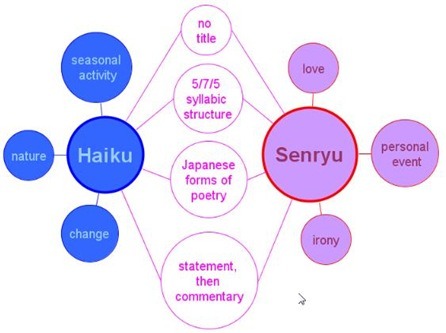Below I have copied for you an article about the differences and similarities between haiku & senryu.
NEITHER is simply a single thought divided into 5/7/5

Akita International Haiku Network
“We all try our best / in our busy,
busy lives / to write poetry.”
What are Haiku, Senryu ?
What are Haiku, Senryu?
To help you get started, here is a short introduction to Japanese poetry styles.
What are Haiku?
Haiku is a form of Japanese poetry, consisting of 17 morae (or on), in three metrical phrases of 5, 7 and 5 morae respectively. Haiku typically contain a kigo, or seasonal
reference, and a kireji, or verbal caesura (cutting word).
English-language haiku poets think of haiku as a Japanese form of poetry generally (but not always) consisting of 17 syllables, usually within three lines, with 5, 7 and 5 syllables.
In Japanese, haiku are traditionally printed in a single vertical line, while haiku in English usually appear in three lines, to parallel the three metrical phrases of Japanese haiku. The essential element of form in English-language haiku is that each haiku is a short one-breath poem that usually contains a juxtaposition of images.
Most haiku writers prefer poems that refer to nature and social events, but some of them don’t always place an exacting seasonal word in the poem. Furthermore, a few of them write haiku
composed on one or two lines in less than 17 syllables. Currently the majority of haiku are written in 11 short syllables in a 3-5-3 format.
And Senryu?
Senryu is a Japanese form of short poetry similar to haiku in construction: three lines with 17 or fewer morae (or on) in total. However, senryu tend to be about human foibles while haiku tend to be about nature, and senryu are often cynical or darkly humorous while haiku are more serious. Unlike haiku, senryu do not include a kireji or verbal caesura (cutting word), and do not generally include a kigo, or seasonal word.
It is often said that both haiku and senryu can be funny, but that if it’s funny, it’s probably senryu. Both haiku and senryu can be about nature, but if it’s about nature, it’s probably a haiku. In addition, both haiku and senryu can be about nature or human nature. Both haiku and senryu can be serious or humorous/satirical. A serious poem about nature is certainly a haiku. And a funny/satirical poem about human nature is certainly a senryu.
I was wondering how many poets even care whether they mislable what they write?
Do you see it as respectfull to the reader to lure them in with an incorrect label?